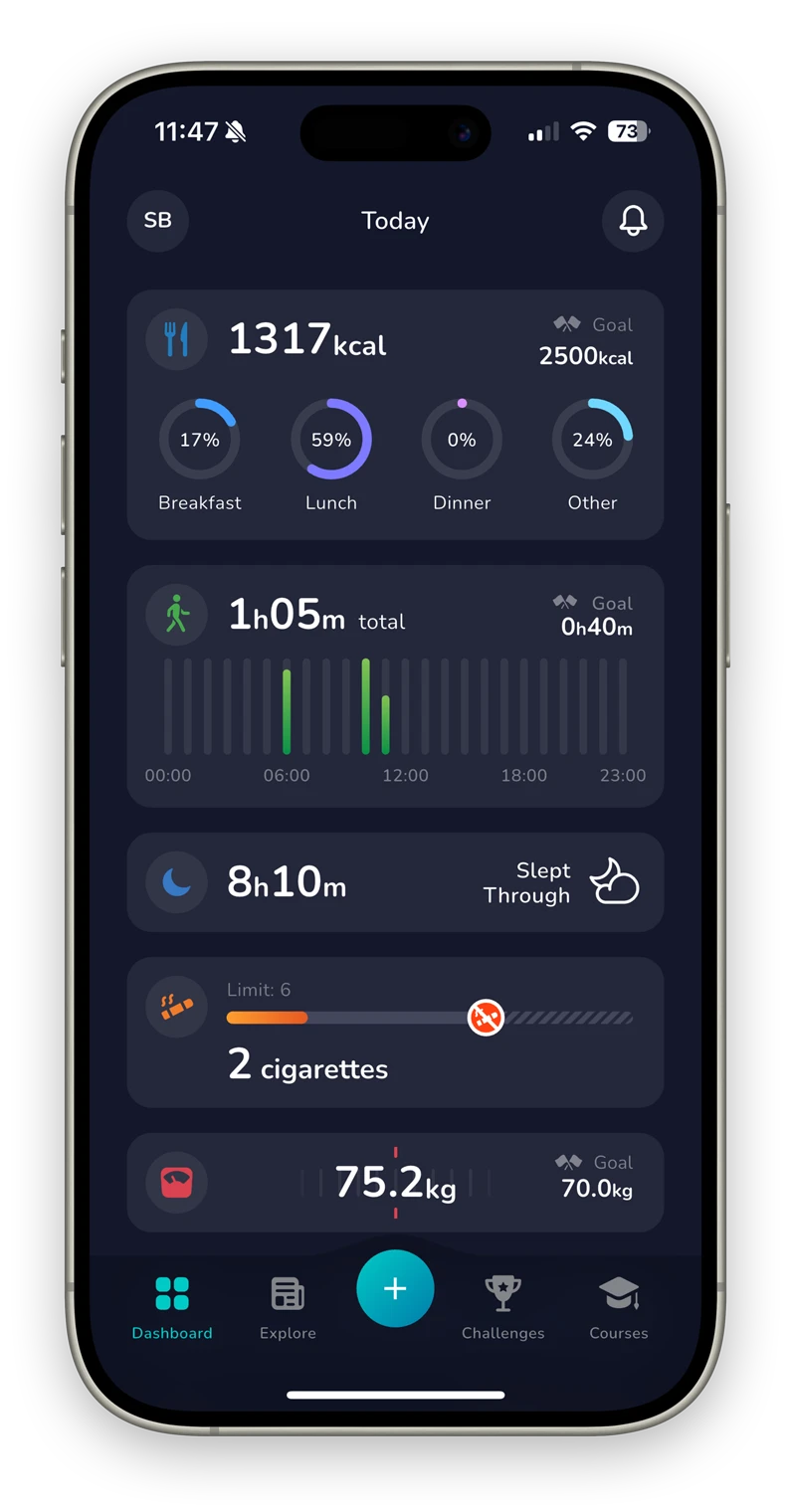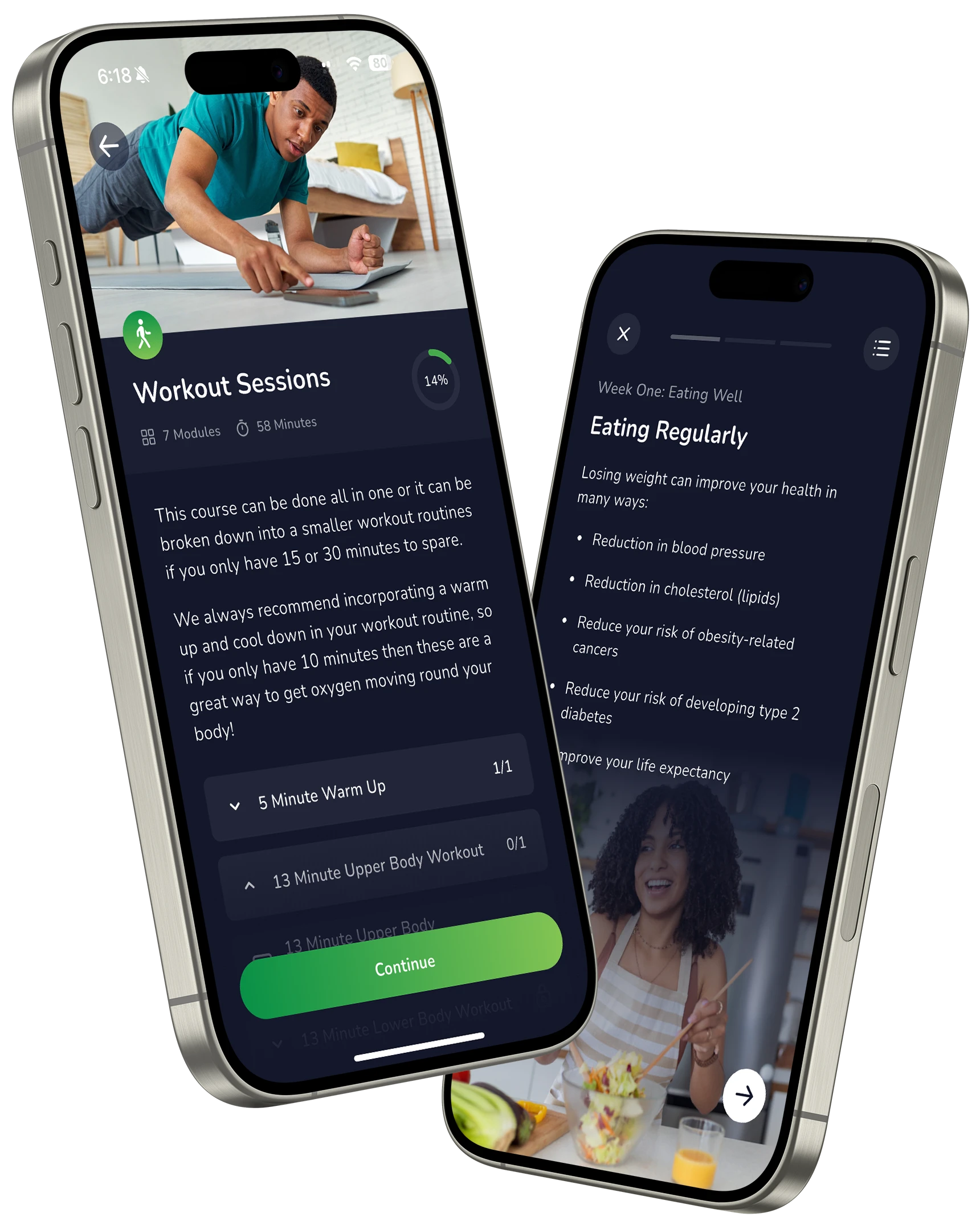AI-powered health apps: your personalised wellness companion
Digital health apps use AI to make sense of data collected by wearables and smart devices. They provide personalised recommendations, including coaching, meal plans, workouts, and mindset advice. This is where AI shines. Processing vast amounts of data and helping users work out the next step to keep making progress.
AI also powers automated reminders, motivational nudges, trend analysis, and progress tracking. These features keep users engaged and informed about their health and wellbeing.
What’s more, AI is built to learn. And, when it’s learning about how you manage your health, that means you get personalised feedback on how to boost your wellbeing. AI-powered health apps are more accurate, less generic and more likely to result in real change.
What to look for in a health app
However, not all health apps are equal! In fact, there are some important features to look out for when choosing your app:
- Multiple habit tracking – health apps should be able to track progress across lots of different health habits
- Smart personalisation – your health app needs to be personalised to YOU, with AI-driven recommendations, coaching, nudges and real-time analysis of your health data
- Easy interface – it needs to be easy to understand your data when it’s presented in the app
- Secure data handling – your health app must keep your data secure and come with the highest accreditation from recognised industry bodies
- Syncs with wearables – health apps should link up to wearables such as Fitbit or Apple Watch, so they have access to the data that’s being collected on our wrists all the time
- Integrates with health providers – the very best health apps offer a seamless experience, allowing users access to their day-to-day health data alongside their patient data from health professionals
Once you’ve found a health app that ticks those boxes, use it to boost your health journey in these eight areas.

1. Move more and move consistently
Most of us now gather vast amounts of data about our movement throughout the day. Steps, heart rate, zone minutes, workouts and activity streaks. But that data needs to be made into recommendations or nudges before it’s really useful.
AI-driven apps send reminders, recovery suggestions, workout recommendations and motivational nudges based on real-time data. This personalised approach means you receive a movement plan built around what your body needs each day. It helps you keep pushing yourself, while taking care of your rest and recovery.
2. Smarter nutrition and diet management
If you want to get to a healthy weight, AI-powered health apps can support you on your weight management journey.
Log meals effortlessly with barcode scanning or photo input. Get personalised recommendations to balance nutrients and manage calories. See trends and nudges, like cutting down on added sugar or boosting fibre. Benefit from training courses and coaching input.
Studies show that smart health apps get you similar results to traditional, clinician-led weight management programmes – without the massive waiting times!

3. Reducing alcohol consumption
If one of your goals is to cut back on how much alcohol you drink, AI-driven health apps can help you do that.
You can track your alcohol consumption over time and set yourself personal goals. Then get visual insights into your drinking patterns through graphs showing how much and when you drink. Apps also gently encourage mindful drinking, through nudges that are delivered without judgment and at times when they will be most impactful in changing your behaviour.
4. Quit or cut down on smoking
Health apps help you track your smoking habits and patterns. Gathering this data in one place allows you to see trends and progress over time, if you’re cutting back gradually. What’s more, with AI, nudges, coaching and motivational support can help you keep up your progress and make changes stick. When you track multiple habits, you’ll also be able to see how giving up smoking impacts other health and wellbeing areas.
5. Sleep more soundly
Sleep quality and duration impacts mood and energy. But it also impacts things like your readiness to exercise, the likelihood of getting to a healthy weight, the quality of your eating, and more. Using a market-leading health app that tracks multiple habits within the same platform, you can see not only sleep patterns and quality, but how these impact on other habits and wellbeing markers.
AI offers suggestions for routines, mindfulness practices, screen-time reductions and other lifestyle factors, which may be impacting your sleep. This helps you better-manage your sleep, in the context of your overall health.

6. Manage stress and emotional wellbeing
Logging your emotions and mood helps you keep track of patterns and trends over time. AI-driven coaching can offer suggestions for journaling, meditation, guided breathing or other regulation techniques. And you can access courses designed to help you navigate difficult seasons.
7. Manage medical needs more easily
If you have a long-term condition, it can be challenging to keep up with your medical requirements. Some – but not all – health apps are able to integrate with GP and NHS systems. This creates a single portal for all your health information, with NHS clinical data displayed alongside day-to-day wellbeing information gathered through wearables and user inputs.
AI health apps create reminders and nudges to remember medication. They also offer appointment and message alerts, improving communication between patients and practitioners.
8. Build better routines with habit tracking
Finally, health apps are great at tracking habits as they build. Whether you want to move for 30 minutes a day or manage your nutrition, your health app can track that for you. And when you add AI into the mix, you’ll benefit from visual illustrations of your progress over time, milestone celebrations, reminders to take action and records of streaks you’ve achieved.
Smart nudges, reminders and recommendations make new habits more successful. For example, one study found that health related nudges were responsible for a 15.3% increase in healthier diet and nutritional choices.
AI-powered health apps allow you to see your progress easily, learn what works for you, and get your habits in line with your goals.
AmaraHealth: a multi-tracking health and wellbeing app
The AmaraHealth™ app is different to other health apps available to the public. Because of its high standards of accreditation and security, it can integrate with both wellbeing wearables and NHS clinical systems. This creates a single-portal for all your health information.
The interface is easy for both service users and clinicians to use, streamlining admin and improving the experience for both patient and practitioner. Receive smart nudges for everything from exercise targets to medication reminders and appointment alerts. And manage your own health and care in ways that work for you.
AmaraHealth™:
- Tracks multiple habits
- Features smart personalisation
- Has an easy-to-use interface
- Has the highest levels of accreditation and security in the industry
- Syncs with major wearables
- Integrates with health providers in the NHS and elsewhere
Building healthier habits shouldn’t rely on willpower alone
Behaviour change is hard. And we now know that motivation and willpower aren’t enough on their own. Making any change – whether that’s reaching a healthier weight, cutting down on smoking, exercising more, or taking medication regularly – relies on habits. With an AI-powered health app in your pocket, you’ll have a proven tool to support habit-creation.
AmaraHealth™ app can help you boost your wellbeing and reduce your risk of chronic conditions by coaching you to build one healthy habit at a time. AmaraHealth™ app is free to use when in receipt of free support from a Public Health or NHS health and wellbeing service.


